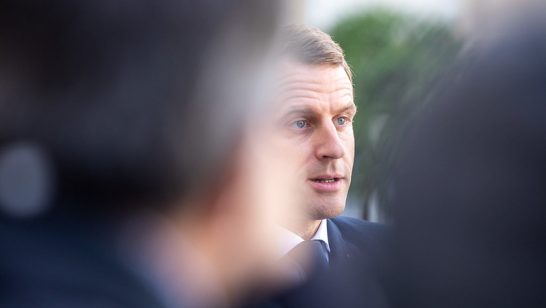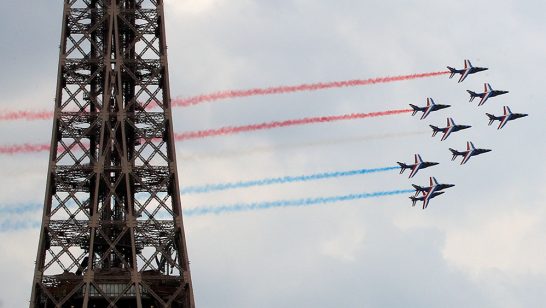
Emmanuel Macron is not known for his modesty or for playing it safe. Through the ups and downs of his “bromance” with Donald Trump, to his wide range of diplomatic initiatives ranging from attempts to engineer a break out of the impasse surrounding the Iran nuclear deal and his veto against EU accession negotiations with Albania and the Republic of North Macedonia, the French president has won admiration as well as contempt. Yet despite this pedigree, his recent initiatives have taken observers by surprise.
In an August speech to the French diplomatic corps, president Macron painted a bleak picture of the state of Europe, warning of nothing less than the demise of European civilization unless the continent finds a way to protect its interests vis-a-vis China, the United States, and other emerging powers. In an age of disruption, the president noted, ‘business as usual’ cannot be an option: “if we continue as before, then we will definitely lose control. And that would mean obliteration.” The sombre tone could not be mistaken.
Yet the real bombshell came with the publication of an hour-long interview with The Economist magazine in which the president both elaborated on this analysis and pondered prescriptions to stave off these developments. What primarily caught readers’ attention were the claims the president made with regards to NATO. These included suggestions that “we should reassess the reality of what NATO is in the light of the commitment of the United States.” More than anything else, observers noted the president’s description of NATO as “brain dead.” Far from walking back from these comments, at the NATO summit in London, Macron doubled down on this statement and called it a necessary “wake-up call.”
Macron’s comments have quite predictably been met with widespread shock and criticism from observers across Europe and elsewhere. As an example, a prominent British analyst noted that Macron’s “latest media outburst was not merely an indiscretion, but a huge betise [stupidity].” A respected French defence analyst called the comments “bizarre” and “dangerous.” And Tom Wright from the Brookings Institution called the interview “provocative, & catastrophic.” Officials were also not impressed. In a statement, the U.S. ambassador to NATO noted that she “firmly disagreed” with the French president’s assessment, and Angela Merkel came with a public rebuttal to Macron’s “sweeping blow” to the Alliance.
One comment: Many dimensions
In early December, we travelled to Paris for a series of short consultations with French policymakers and officials to discuss, amongst other things, what lies behind the President’s remarks. While Mr Macron’s views were presented forcefully, some would say unnecessarily bluntly, they can only be understood as an extension of already formulated policies. The President’s speech in Sorbonne, in 2017, was widely applauded. As noted by Fabrice Pothier in the Survival Editor’s Blog at the time, “In today’s European political context, defence offers the clearest point of convergence among small and large member states, European doves and hawks.”
So, as noted by one official we spoke to, the new statement is “not a change of direction” and is, certainly, “anything but naive.” Since assuming power in 2017, Macron has pushed hard for autonomy. As a French ambassador asked one of us with some bewilderment, “were you really surprised by this?” However, our discussants all readily agreed that the comment represents a “new level of frankness.”
There is also a Middle Eastern dimension to Macron’s comments; a reflection of French interests and presence in the region. As one official noted, this point is too easily missed by European allies. When Macron spoke of NATO’s woes, he was specifically taking aim at the US withdrawal from Syria and the ensuing Turkish invasion, a series of events that caused furore not just in France but across NATO and elsewhere. The lack of coordination combined with the speed of the US withdrawal also forced France to take urgent steps to protect its own military and civilian personnel in the region. These actions likely served to reinforce the ideas presented in 2017, about the need to strengthen European capabilities and coordination.
A final point pertains to the specific term of “brain death.” According to a senior French official with insights into the administration, the term (a direct translation of the French “mort cérébrale”) was anything but a misnomer. Rather, what Macron is referring to is that NATO is operationally strong while suffering a political crisis (hence the “brain death” while limbs are fully functioning). This too is a fairly conventional assessment. NATO is evidently operationally strong – the Alliance has lived up to its Wales declaration from 2014, pursued an Enhanced Forward Presence in the Baltics and Poland, and improved on logistics and operational planning. Meanwhile, few would dispute the fact that NATO is suffering from a lack of political cohesion.
The French strategy may well be, as president Macron himself acknowledged in his speech to ambassadors, one of “putting France at the heart of the diplomatic game.” Yet the risk, as one French official noted, is that the Elysée’s plethora of grand initiatives ends up undermining the efforts to strengthen European defence. As allies feel confused by the president’s critique of NATO, with his overtures to Russia and vigorous push for autonomy, the need for deeper European defence coordination might be more difficult to sell. But as Macron has made clear, he would rather get caught trying.
The opinions articulated above represent the private views of the author, and do not necessarily reflect the position of the organisation he works for, or of the European Leadership Network or any of the ELN’s members. The ELN’s aim is to encourage debates that will help develop Europe’s capacity to address the pressing foreign, defence, and security challenges of our time.




